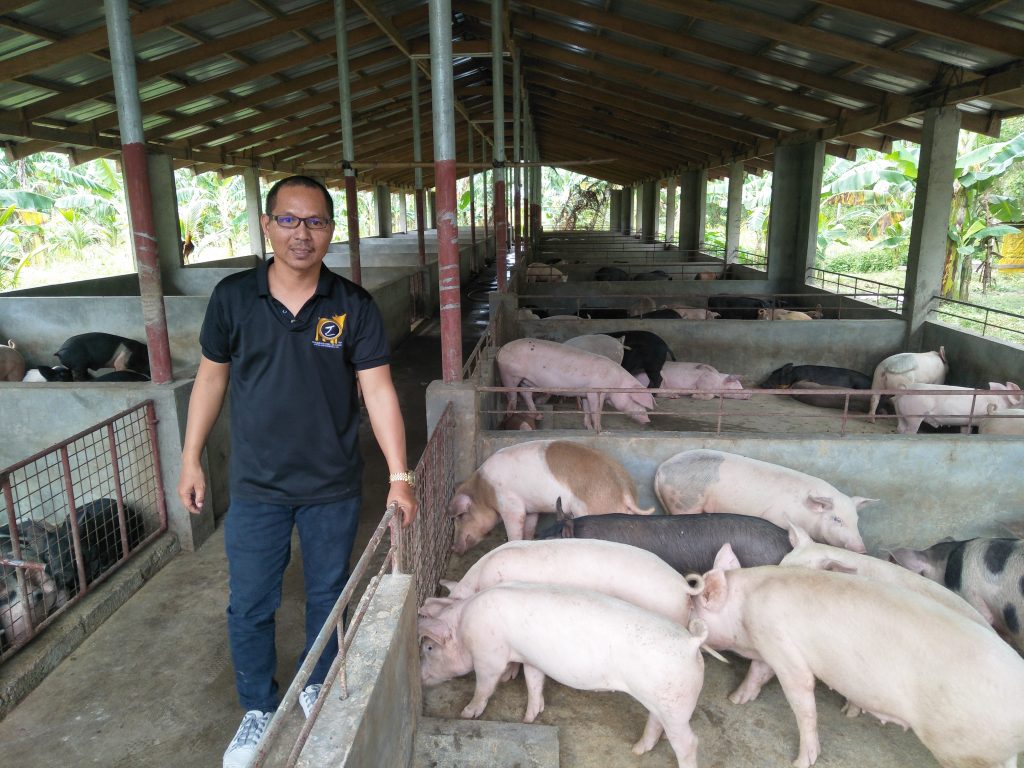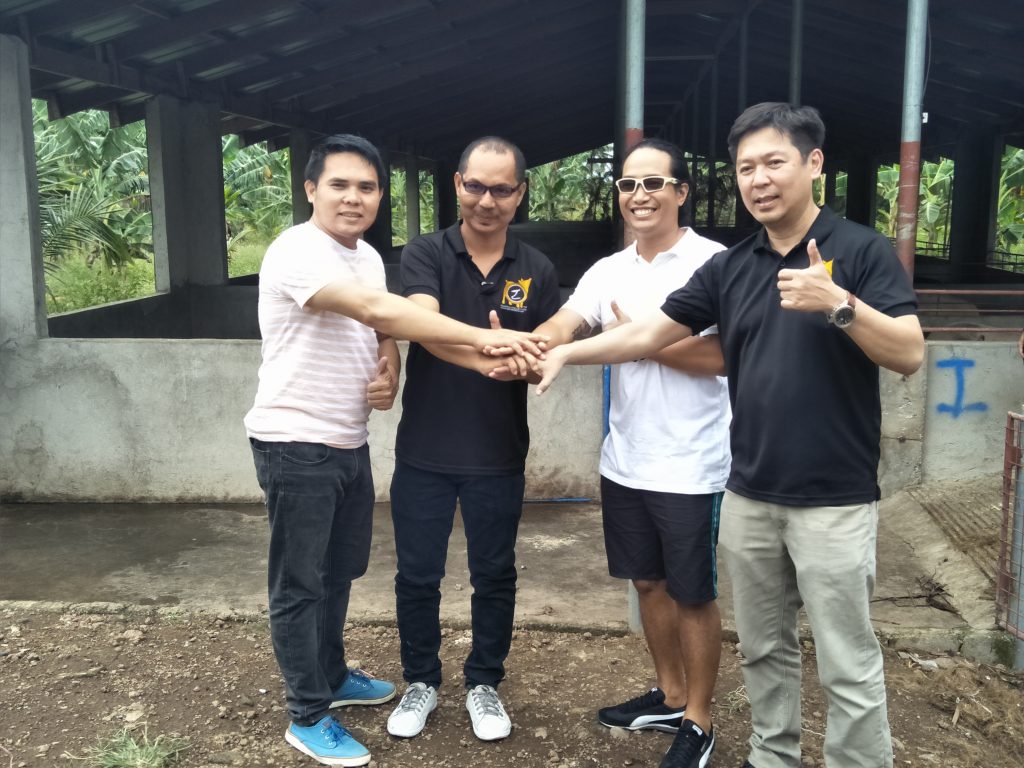More than just a lechón


Every celebration in the Philippines calls for a feast. While native delicacies are always present on the buffet table, lechón is the dish that should not be missed. Lechón is a Spanish word for roasted suckling pig. It is cooked over charcoal for several hours making the pork skin crispy.
Lechón is popular in the Philippines and in other Spanish-speaking nations in Latin America and Spain. In fact, lechón is the national dish of Cuba. In the Philippines, the lechón of Cebu is the most famous in terms of the quality of pig as recognized by the late American chef Anthony Bourdain.
But what really makes a perfect lechón?
The birth of a change agent
In Candelaria, Quezon, there’s this man named RuelMariano Marquez who is fondly called by his neighbors as “Boss”. He is not, however, the typical boss you’ll see holding meetings in a conference room or someone who is in suit roaming around the metro. Ruel is the boss of the masses. People in their community give high respect to this man because of his dedication in supporting local farmers by letting them venture into hog raising business.
Ruel grew up in a family whose source of living comes from pig farming and outsourcing. This kind of business venture is profitable considering the short span of time needed to grow a pig for lechón. Ruel’s family, composed of seven siblings with him being the second eldest, has been supplying pigs to lechón producers. At a young age, Ruel stood up and took responsibility of their family business due to his father and eldest sibling’s illnesses. In effect, Ruel chose not to pursue his high school education.
When Ruel met Pambansang Lenchon (Elarz) in 2015, he and his wife decided to let their neighbors take charge in raising the pigs to at least share with them the chance of starting a business. Ruel also expanded his farm’s pigpen to accommodate the number of pigs they can outsource everyday.
“I have seen and experienced the spite of poverty. I know it is hard that is why I am doing this to at least help my neighbors earn additional income,” said Ruel.
Ruel provides every household the piglets and their needed feeds and organic foods. The only requirement is that every household should have their own pigpen. Some of the potential hog raisers have no budget for its construction. Luckily, like Ruel, these households are also clients of CARD Bank, a microfinance-oriented rural bank, which provided them loans to start their desired business venture.
According to Ruel, the income of this kind of business venture is derived after the cost of piglet and its food are subtracted from the gross sales. The minimum number of pigs every household can accommodate is at least 30, which could generate more than P15,000 in just two months.
Providing access
As the demand for supply increases, the need for additional capitalization is sought by Ruel. In 2017, Ruel was introduced by Elarz to CARD-Business Development Service Foundation Inc. (CARD-BDSFI) through the foundation’s chief executive Julius Adrian Alip. The foundation through CARD Leasing and Finance Corporation (CLFC) helped Ruel in acquiring the huge lot he needs for his pigpen.
The CARD-BDSFI is a dynamic, flexible, and innovative foundation that provides marketing, business development, and linkage and networking of CARD clients and different communities to the mainstream market. Likewise, CLFC finances social enterprise and micro, small, and medium enterprises (MSMEs) that are potential in creating value proposition for microentrepreneurs. These two companies are member institutions of CARD Mutually Reinforcing Institutions (CARD MRI), a group of 21 development-oriented institutions that aims to eradicate poverty in the country.
This investment let Ruel open doors in Oriental Mindoro. “This is a dream realized because my only hope is to make every household have the opportunity to earn money and save for their family,” he added.
Together with CARD-BDSFI, Ruel organized series of community meetings in the areas of Oriental Mindoro and introduced his advocacy. It was never hard for Ruel to look for hog raisers because majority of them are clients of CARD financial institutions like him.
“Our scheme in Mindoro is different because majority of the households have the capacity already to buy and raise pigs. What they are just afraid of are sure buyers. So, I assured them by constructing a pigpen where they could stock their ready-to-lechón pigs,” shared Ruel.
From two pigs, every household tapped by Ruel and CARD-BDSFI in Mindoro is now raising up to seven pigs. CARD-BDSFI and Ruel also organized series of trainings especially on how to naturally raise pigs. “This opportunity allowed our microfinance clients in Mindoro to gain knowledge on how to raise pigs naturally. It also taught them to plant the usual crops these pigs can consume,” said Alip.
For now, the pigs that Ruel and his farmers are raising are semi-organic where commercial feeds and root crops are mixed together. But Ruel hopes to convert few of his farms to become fully organic.
To date, Ruel has 12 hog raisers in Quezon Province and more than 600 families in 12 areas in Oriental Mindoro that supply him with pigs. In Quezon Province, they harvest at least 800 pigs every two months. In Mindoro, they at least harvest 350 pigs per week.
Ruel also hopes to increase the number of household-suppliers of pigs next year covering the occidental part of Mindoro.
Asset ownership
Vilma and Edelberto de Chavez, hog raisers for more than three years, said that the opportunity allowed them to provide food on their table everyday. “Every week, we sold at least 10 pigs to Ruel. Then another set of piglets are given to us to raise for few months. This flow of business is keeping our family needs intact,” added Vilma.
At first, it was actually quite hard because you are only raising piglets that would be sold within two to four months. In between those months, struggles not on what to feed the pigs but on what these caretakers will feed themselves arise.
“I know that it is not easy at first. That is why, every husband of our hog raisers in Quezon becomes my buy and sell agent,” said Ruel adding that they’re able to buy at least 40 pigs everyday.
“Becoming one of Ruel’s agents helped me in providing food on our table and paying our bills,” shared Edelberto.
According to Ruel, you just have to be mindful in managing your cash flow in this kind of business. “Financial management is very important here. That is why, after initial harvest, I remind them to save and invest for something that they could benefit on a short or long term basis,” explained Ruel.
After the first harvest in de Chavez’s farm, he allotted a budget for an additional pigpen. Then eventually, the couple was able to buy motorcycle, renovate their house, sustained the education of their children, and pays their electricity and water bills monthly.
Integrating advanced technologies
As the demand of naturally grown hogs becomes the preferred taste of the masses, Ruel also needs to strategically map and monitor its growing hog raisers.
“The supply chain should flow smoothly and this is where advanced technologies come in. In the coming months, we will be working with Ruel and Elarz on investing a cloud-based system where the growth of every pig is monitored to pin the exact time for harvesting,” emphasized Alip.
“Monitoring is significant here considering the huge volume of caretakers of Ruel. To harmonize the harvesting process, a system should be implemented,” added Alip.
More than just monitoring, the proposed system will also allow potential buyers to search for or buy naturally grown pigs within their area.
“This is a huge decision we will all journey but as we are planning to replicate this initiative in Visayas and Mindanao, Ruel, BDSFI, and Elarz should be two steps ahead already,” said Manuel Enrique Zalamea, owner of Elarz.
Moreover, it is also the goal of Elarz, as emphasized by Manuel, to teach Filipino farmers three things – first is the “First World Philippines” where Filipino farmers can earn substantially for making the best breed of lechón. According to Manuel, the Philippines has 30 million hectares of land and 47% of it is for agriculture. “So if we can develop that 47% agricultural land we can make the farmer earn substantially and eventually create a first world Philippines,” he added.
The second thing Manuel would like to teach is to “Save the Planet” where Elarz and BDSFI will teach farmers the incorporation of biogas that fits small scale backyard farmers. Lastly is for Filipinos to have “Celebrations made Healthy” where the lechón prepared during celebrations are grown naturally or organic.
“In organic and natural farming, 50% of the cost will potentially be reduced that will allow our farmers to earn more. Beyond that, it is providing Filipinos the best quality and organic pig for lechón that matter most,” added Manuel.
This is what makes a perfect lechón – more than just being naturally grown, you are also helping local agri-farmers to grow. The next time you order a lechón, make sure you slice the right one!
